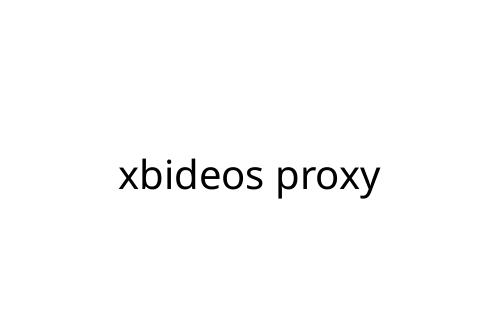xbideos proxy
If you’re searching for a way to access xbideos when it’s blocked or restricted, you’ve likely come across the term “xbideos proxy.” This guide breaks down what a proxy is, how it relates to xbideos, common uses, potential risks, and safer alternatives. The aim is to help you understand your options and make informed decisions.
What is an xbideos proxy?
A proxy is a server that acts as an intermediary between your device and the website you want to visit. When you use an xbideos proxy, your web traffic is routed through this third-party server before reaching the main xbideos site. This can allow you to access xbideos even when it’s blocked by your ISP, school, workplace, or local government.
Why people use proxies for xbideos
There are several reasons why someone might look for an xbideos proxy:
- Bypass Restrictions: Some countries or networks block adult sites. A proxy can help sidestep those blocks by masking your real location.
- Anonymity: Using a proxy means your real IP address isn’t listed when you visit xbideos, adding a layer of privacy.
- Testing and Research: Webmasters or analysts may use proxies to view geo-restricted content or test site performance from different locations.
Pros of Using an xbideos Proxy
- Easy Access: Most proxies require nothing more than entering a URL on a web page.
- No Installation: Many are web-based, so there’s no software to download.
- Free Options: Numerous xbideos proxy sites operate without cost.
Cons and Risks
- Privacy Concerns: Not all proxies are secure. Some may log your activities or inject ads and malware.
- Slower Speeds: Routing traffic through an extra server often slows down browsing.
- Unreliable Access: Proxy sites can get blocked or go offline without notice.
- Limited Security: Proxies may not encrypt your data, exposing your browsing to third parties.
- Legal and Ethical Risks: In some places, bypassing filters or accessing adult content is illegal.
Safer Alternatives to Proxies
While xbideos proxy services offer a quick fix, you may want to consider more robust tools for privacy and accessibility:
- VPNs: A Virtual Private Network encrypts your data and masks your IP address. VPNs typically provide stronger privacy than basic proxies.
- Tor Browser: Tor routes your traffic through multiple nodes and can access blocked content with added anonymity.
- HTTPS: Always ensure the proxy (or site) uses HTTPS for a secure connection.
Practical Tips
If you decide to use an xbideos proxy:
- Choose a reputable provider; check for independent reviews.
- Avoid entering personal information while on proxy sites.
- Clear your browser cache and cookies after each session.
- Understand local laws and workplace or school policies before accessing restricted sites.
The Bottom Line
An xbideos proxy is a common solution for users wanting to bypass restrictions and access blocked content. However, proxies come with risks—especially regarding privacy and security. Alternatives like VPNs provide stronger protection, but no method is 100% foolproof. Know your reasons, weigh the pros and cons, and always prioritize your online safety and legal responsibilities.


 Real Estate Specialist
Summer Hodgkinson is the real estate specialist at Luxe House Maker, offering expert insights into the world of luxury property markets. With a background in high-end real estate sales, Summer has a keen eye for identifying the most exclusive and sought-after properties. Her in-depth knowledge of the global luxury real estate landscape allows her to provide readers with valuable advice on investment opportunities, emerging markets, and the latest trends in upscale living. Summer’s expertise ensures Luxe House Maker stays on top of the ever-evolving luxury property market, helping readers make informed decisions.
Real Estate Specialist
Summer Hodgkinson is the real estate specialist at Luxe House Maker, offering expert insights into the world of luxury property markets. With a background in high-end real estate sales, Summer has a keen eye for identifying the most exclusive and sought-after properties. Her in-depth knowledge of the global luxury real estate landscape allows her to provide readers with valuable advice on investment opportunities, emerging markets, and the latest trends in upscale living. Summer’s expertise ensures Luxe House Maker stays on top of the ever-evolving luxury property market, helping readers make informed decisions.
